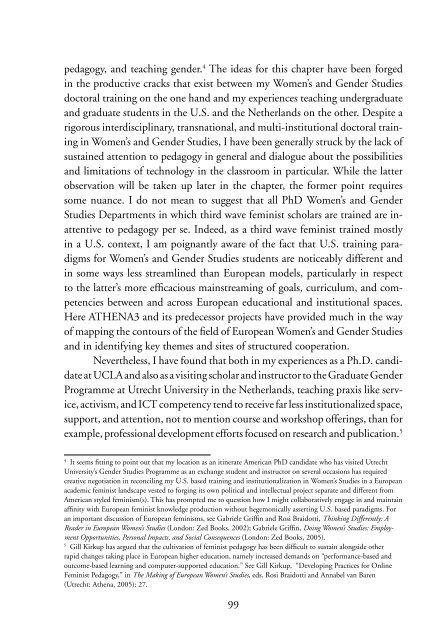Teaching with the third wave new feminists - MailChimp
Teaching with the third wave new feminists - MailChimp
Teaching with the third wave new feminists - MailChimp
You also want an ePaper? Increase the reach of your titles
YUMPU automatically turns print PDFs into web optimized ePapers that Google loves.
pedagogy, and teaching gender. 4 The ideas for this chapter have been forgedin <strong>the</strong> productive cracks that exist between my Women’s and Gender Studiesdoctoral training on <strong>the</strong> one hand and my experiences teaching undergraduateand graduate students in <strong>the</strong> U.S. and <strong>the</strong> Ne<strong>the</strong>rlands on <strong>the</strong> o<strong>the</strong>r. Despite arigorous interdisciplinary, transnational, and multi-institutional doctoral trainingin Women’s and Gender Studies, I have been generally struck by <strong>the</strong> lack ofsustained attention to pedagogy in general and dialogue about <strong>the</strong> possibilitiesand limitations of technology in <strong>the</strong> classroom in particular. While <strong>the</strong> latterobservation will be taken up later in <strong>the</strong> chapter, <strong>the</strong> former point requiressome nuance. I do not mean to suggest that all PhD Women’s and GenderStudies Departments in which <strong>third</strong> <strong>wave</strong> feminist scholars are trained are inattentiveto pedagogy per se. Indeed, as a <strong>third</strong> <strong>wave</strong> feminist trained mostlyin a U.S. context, I am poignantly aware of <strong>the</strong> fact that U.S. training paradigmsfor Women’s and Gender Studies students are noticeably different andin some ways less streamlined than European models, particularly in respectto <strong>the</strong> latter’s more efficacious mainstreaming of goals, curriculum, and competenciesbetween and across European educational and institutional spaces.Here ATHENA3 and its predecessor projects have provided much in <strong>the</strong> wayof mapping <strong>the</strong> contours of <strong>the</strong> field of European Women’s and Gender Studiesand in identifying key <strong>the</strong>mes and sites of structured cooperation.Never<strong>the</strong>less, I have found that both in my experiences as a Ph.D. candidateat UCLA and also as a visiting scholar and instructor to <strong>the</strong> Graduate GenderProgramme at Utrecht University in <strong>the</strong> Ne<strong>the</strong>rlands, teaching praxis like service,activism, and ICT competency tend to receive far less institutionalized space,support, and attention, not to mention course and workshop offerings, than forexample, professional development efforts focused on research and publication. 54It seems fitting to point out that my location as an itinerate American PhD candidate who has visited UtrechtUniversity’s Gender Studies Programme as an exchange student and instructor on several occasions has requiredcreative negotiation in reconciling my U.S. based training and institutionalization in Women’s Studies in a Europeanacademic feminist landscape vested to forging its own political and intellectual project separate and different fromAmerican styled feminism(s). This has prompted me to question how I might collaboratively engage in and maintainaffinity <strong>with</strong> European feminist knowledge production <strong>with</strong>out hegemonically asserting U.S. based paradigms. Foran important discussion of European feminisms, see Gabriele Griffin and Rosi Braidotti, Thinking Differently: AReader in European Women’s Studies (London: Zed Books, 2002); Gabriele Griffin, Doing Women’s Studies: EmploymentOpportunities, Personal Impacts, and Social Consequences (London: Zed Books, 2005).5Gill Kirkup has argued that <strong>the</strong> cultivation of feminist pedagogy has been difficult to sustain alongside o<strong>the</strong>rrapid changes taking place in European higher education, namely increased demands on “performance-based andoutcome-based learning and computer-supported education.” See Gill Kirkup, “Developing Practices for OnlineFeminist Pedagogy,” in The Making of European Women’s Studies, eds. Rosi Braidotti and Annabel van Baren(Utrecht: A<strong>the</strong>na, 2005): 27.99
















